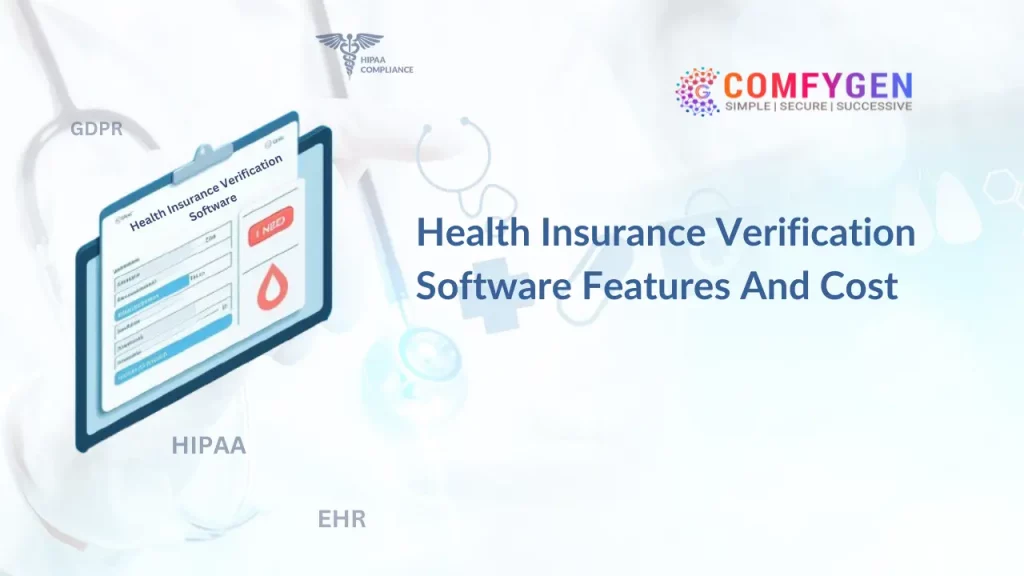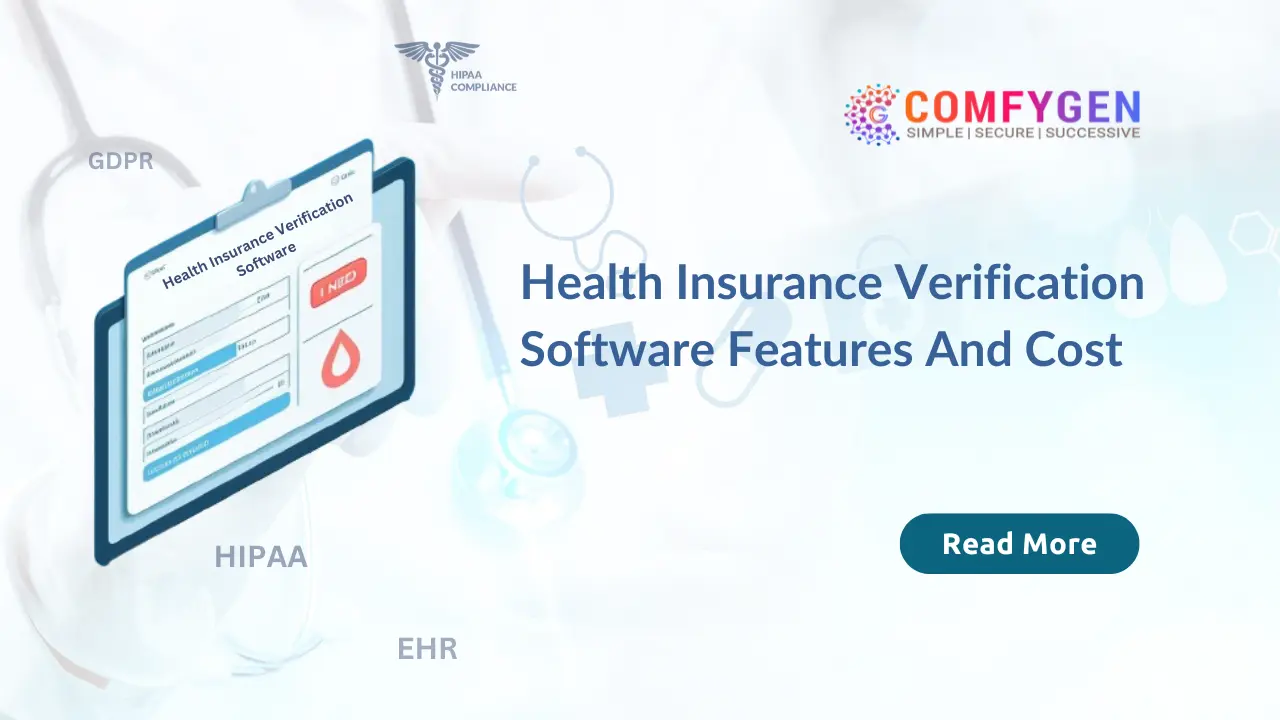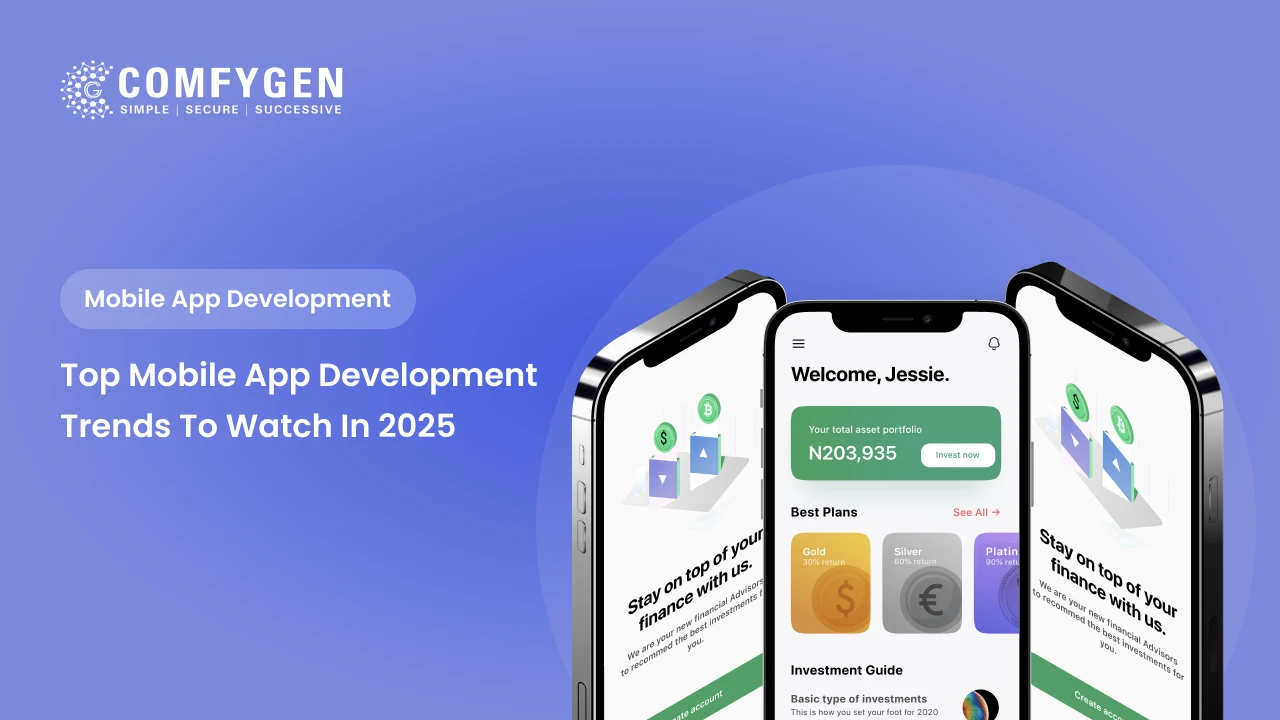Health Insurance Verification Software Features and Cost to Develop

The health insurance industry has experienced substantial growth, especially post-COVID-19, as people recognize the importance of health coverage. With the rise of digital solutions, consumers now prefer to browse and purchase services online. This shift has led to an increased demand for health insurance software development services, offering significant benefits to the healthcare sector.
In this blog, we will explore key aspects of health insurance software development, including Types of health insurance software, essential features and the cost of developing health insurance software. Let’s start by understanding the basics of health insurance software and its relevance in today’s healthcare landscape.
What is Health Insurance Software?
Health insurance software is a digital tool designed to manage and streamline processes related to health insurance verification, claim submission, and reimbursement. Health insurance software verifies a patient’s insurance coverage, ensures eligibility, and processes claims, ensuring compliance with healthcare standards such as HIPAA (Health Insurance Portability and Accountability Act).
It reduces the burden on healthcare providers, ensures patients receive the benefits they are entitled to and speeds up the revenue cycle management process. Many companies are looking for healthcare app development companies for their clients.
Health insurance verification software is typically integrated with healthcare systems such as electronic health records (EHR) or electronic medical records (EMR) to provide real-time data on patients’ insurance coverage and status.
Market Statistics of Health Insurance Software
The market for health insurance software is rapidly growing, with an increasing number of healthcare providers adopting these solutions to improve the efficiency of their billing processes. According to recent industry reports:
- The global healthcare claims management market is expected to reach $13.93 billion by 2028, with a compound annual growth rate (CAGR) of 5.8% from 2021 to 2028.
- The growing adoption of cloud-based health insurance verification solutions has been a significant contributor to this growth, as it allows for scalability and accessibility.
- The North American market is currently the largest in terms of market share, driven by the extensive use of medical insurance apps by healthcare providers and payers, including hospitals, private clinics, and insurers.
The growth is driven primarily by the need to improve data accuracy, process claims more rapidly, and comply with stringent regulations like HIPAA and GDPR.
Types of Health Insurance Software
Cloud-Based Health Insurance Software
Cloud-based health insurance verification software is hosted on remote servers and accessed via the Internet, allowing users to verify insurance eligibility from any location or device with Internet connectivity. This model offers several advantages:
- Scalability: Cloud-based systems can easily scale to meet the needs of growing healthcare organizations. As the volume of patients increases, providers can scale up their software without worrying about hardware limitations.
- Accessibility: Cloud solutions offer the flexibility of accessing the platform from any internet-enabled device, whether from an office, home, or mobile device. This is particularly useful for telemedicine services and remote healthcare providers.
- Cost-Effective: Cloud-based systems generally have lower upfront costs compared to on-premise solutions, making them more accessible to small and medium-sized healthcare providers. Instead of a large initial investment, providers typically pay a subscription fee, which can be more budget-friendly in the short term.
- Automatic Updates: Cloud providers handle system updates and maintenance, ensuring that the platform remains up-to-date with the latest features and security patches, without requiring intervention from the healthcare provider’s IT team.
Cloud-based health insurance verification software is ideal for providers seeking a flexible, cost-efficient solution that doesn’t require complex in-house IT infrastructure. It’s especially suitable for multi-location healthcare practices or telemedicine services.
On-Premise Health Insurance Software
On-premise health insurance verification software is installed and hosted on the healthcare provider’s own servers, providing greater control over data, security, and customization. While cloud-based solutions are increasingly popular, on-premise software still offers some important advantages:
- Data Control: On-premise systems allow healthcare providers to maintain full control over their data. This is particularly important for organizations that handle highly sensitive patient information and want to avoid storing it on third-party servers.
- Customization: With on-premise software, organizations can tailor the system to their specific needs, often making deep customizations that are not possible with cloud-based platforms.
- Enhanced Security: While cloud platforms offer strong security measures, some organizations prefer to manage their own data security protocols, including encryption and access control. On-premise systems provide this flexibility.
However, on-premise software requires significant upfront investment in hardware and IT personnel to maintain and update the system. It is best suited for large healthcare organizations with extensive resources, such as hospitals or large healthcare networks.
Maintenance of Legacy Insurance Software
Legacy insurance software refers to older systems that were built on outdated technology but are still being used by healthcare providers and insurers. These systems often lack modern features like real-time verification or cloud access, but many organizations continue to use them due to the cost and complexity of transitioning to newer platforms.
- Challenges with Legacy Systems: Legacy software can be expensive to maintain and may not be compatible with modern technologies such as EHRs, cloud solutions, or mobile applications. They often require extensive manual work, leading to inefficiencies and a higher risk of errors.
- Upgrading and Integration: Healthcare providers may choose to upgrade their legacy software by integrating it with modern platforms. This can extend the life of the software and allow for new features like real-time eligibility checks and automated billing to be added.
- Security Risks: Legacy systems may also present security vulnerabilities, as they may not be updated with the latest cybersecurity protocols, potentially exposing patient and insurance data to unauthorized access.
Maintaining legacy insurance software is often a temporary solution for organizations that are in the process of transitioning to newer, more advanced systems.
CRM for Agents and Brokers
In addition to software for healthcare providers, health insurance verification software also extends to Customer Relationship Management (CRM) systems designed specifically for insurance agents and brokers. These systems focus on managing customer interactions, policy renewals, and claims assistance:
- Customer Relationship Management: CRMs for agents and brokers allow them to manage their client base, track policy renewals, and provide timely updates on claims or coverage changes. It helps agents better understand the needs of their clients and provide personalized services.
- Policy and Claims Tracking: The CRM helps agents track policy details, claims status, and client information in one platform, ensuring that they can provide up-to-date information to clients and insurers.
- Sales and Marketing Tools: Many CRMs offer integrated marketing tools that allow agents to send targeted emails or messages to clients regarding new policy options, policy renewals, or other relevant information.
CRM software for agents and brokers is essential for improving customer retention, streamlining operations, and boosting sales efficiency. It ensures that agents stay on top of client relationships and policy changes while automating much of the paperwork associated with managing health insurance.
Key Features of Health Insurance Verification Software
Developing or choosing health insurance verification software means focusing on several essential features that improve efficiency, reduce errors, and enhance overall service quality. To consider when selecting Health Insurance Verification Software, here are some key features:
- Real-Time Eligibility Verification
This feature allows healthcare providers to instantly verify a patient’s insurance eligibility. It checks the patient’s coverage status, the scope of their coverage, and any exclusions like pre-existing conditions. Real-time verification helps avoid claim denials due to ineligibility, making the billing process smoother.
- Automated Data Entry and Updates
Automation is crucial in reducing manual tasks and human errors. The software should automatically input and update patient details, saving time for administrative staff. This ensures that the patient information is always accurate and up-to-date, reducing delays in the verification process.
- Integration with EHR/EMR Systems
Seamless integration with Electronic Health Records (EHR) systems is a must. This feature allows healthcare providers to access patient records, medical history, and insurance coverage from one place. It streamlines the workflow and helps prevent data redundancies.
- Multi-Payer Support
Healthcare providers often work with multiple insurance companies. The software should support integration with various payers, allowing quick and easy verification of insurance coverage across different platforms. This simplifies the claims process and minimizes delays.
- Error Detection and Claim Validation
Built-in error detection helps identify potential issues before a claim is submitted, reducing the risk of denials or delays. The software should also validate claims automatically, ensuring all required information is included and flagging any discrepancies for review.
- Secure Data Handling and Compliance (HIPAA, GDPR)
Security is critical when dealing with sensitive patient data. The software must comply with regulations like HIPAA (in the U.S.) and GDPR (in Europe). Key security features should include encryption, data masking, and audit trails to protect patient information and ensure regulatory compliance.
- Custom Reporting and Analytics
Customizable reports allow healthcare providers to monitor key metrics such as claims processing, patient eligibility checks, and reimbursement cycles. Analytics can help identify inefficiencies and areas for improvement, enhancing the overall billing and insurance verification process.
- User-Friendly Interface and Mobile Access
A simple and intuitive user interface (UI) is essential for ensuring that healthcare staff can easily navigate the software. Additionally, mobile access is becoming more important, allowing professionals to verify insurance details on any device, from anywhere.
By prioritizing these features, healthcare providers can choose or develop health insurance verification software that improves efficiency, enhances the patient experience, and ensures compliance with industry standards.
Benefits of Health Insurance Verification Software
Using health insurance verification software offers many advantages for healthcare providers and patients. It simplifies processes, improves accuracy, and enhances the overall experience for everyone involved. Let’s explore the benefits of health insurance verification software:
- Improved Accuracy in Claims Processing
Health insurance verification software ensures that claims are processed with real-time data verification and error-checking. This significantly reduces errors and prevents claim rejections, helping healthcare providers avoid delays and ensure faster payments.
- Reduced Administrative Work
Automating tasks such as data entry, claims validation, and insurance eligibility checks lightens the load on administrative staff. This enables healthcare providers to spend more time caring for patients rather than dealing with paperwork. This is one of the major benefits of health insurance software development.
- Faster Reimbursement Process
With accurate and compliant claims submission, the reimbursement process is faster. This helps healthcare providers receive payments more quickly, improving cash flow and operational efficiency. Solutions from healthcare software development companies make this process smoother and more efficient.
- Better Patient Experience
Patients experience a more seamless billing process, which reduces confusion and disputes over insurance coverage. This makes for a better experience overall, creating stronger relationships between patients and healthcare providers. Insurance mobile app development can also further enhance this by making insurance interactions more accessible for patients.
- Fewer Denials and Delays
Real-time verification of patient information and insurance eligibility minimizes the chances of claim denials and delays. This ensures that patients can receive care quickly and providers can avoid the hassle of dealing with rejected claims.
A Step-by-Step Guide to Custom Health Insurance Verification Software Development
Building a custom health insurance verification software requires careful planning and a clear understanding of the custom insurance software development process. Here’s how you can approach it:
Step 1: Define the Requirements
Start by defining what the software needs to do. Speak with healthcare providers and insurers to identify essential features, such as real-time verification, support for multiple insurance payers, and integration with Electronic Health Records (EHR) or Electronic Medical Records (EMR). Companies that offer health insurance software development services can help gather these requirements.
Step 2: Select the Right Technology Stack
Choose the technology that will power your platform. For cloud-based systems, you might use platforms like AWS or Azure. For on-premise solutions, traditional servers could be a better fit. The right tech stack will ensure that your platform is scalable, secure, and efficient.
Step 3: Design an Easy-to-Use Interface
The platform’s user interface (UI) should be simple and intuitive. Healthcare professionals need to navigate it quickly and easily. It should work well on all devices, including mobile, which is key when considering insurance mobile app development.
Step 4: Build Core Features
Focus on building the platform’s core features first. These should include real-time eligibility checks, automated data entry, and multi-payer integration. Make sure your software handles errors effectively, ensures secure data transfer, and validates claims accurately.
Step 5: Ensure Data Security and Compliance
Security is crucial when handling sensitive healthcare data. The platform should include strong encryption, two-factor authentication, and regular security audits. It must also comply with regulations such as HIPAA Compliance in mobile health apps and GDPR. Working with custom insurance software development providers will help ensure your platform is secure and compliant.
Step 6: Test and Launch the Platform
Thoroughly test the platform using real-world scenarios to ensure it performs well under different conditions. Once the testing phase is complete, deploy the software to healthcare providers and offer training to help their staff get up to speed.
Cost to Develop Health Insurance Verification Software
The cost to develop health insurance verification software can vary depending on several factors, including the complexity of the features, development team location, platform choice (cloud-based vs. on-premise), and compliance with regulations such as HIPAA or GDPR. On average, the development cost can range from $50,000 to $200,000 for a fully functional platform with standard features like real-time verification, integration with EHR systems, and multi-payer support.
Here’s a breakdown of the cost factors involved in developing health insurance verification software:
| Cost Factor | Estimated Cost Range | Description |
|---|---|---|
| Platform Type (Cloud vs. On-Premise) | $10,000 – $50,000 | Cloud solutions are more cost-effective, while on-premise requires higher investment. |
| Core Features (Eligibility, Billing) | $20,000 – $70,000 | Real-time eligibility verification, claims validation, and error detection. |
| Integration with EHR/EMR Systems | $10,000 – $30,000 | Integrating with electronic health records and medical systems for seamless operation. |
| Compliance & Security | $5,000 – $20,000 | Ensuring the system complies with regulations like HIPAA, GDPR, and offers encryption. |
| Mobile Access and User Interface (UI/UX) | $8,000 – $25,000 | Development of mobile access, user-friendly design, and dashboards. |
| Custom Analytics and Reporting | $5,000 – $15,000 | Custom reports and analytics to monitor performance and compliance. |
| Testing and Quality Assurance (QA) | $5,000 – $20,000 | Ensuring system functionality, security, and bug fixes. |
| Maintenance and Updates | $5,000 – $10,000 annually | Ongoing updates, feature upgrades, and support for software after launch |
Estimated hourly rates for developing health insurance verification software based on the location of the development team:
| Location | Hourly Rate (USD) | Estimated Cost Range |
|---|---|---|
| United States/Canada | $100 – $250 | $100,000 – $1,000,000 |
| Western Europe | $80 – $150 | $80,000 – $600,000 |
| India | $40 – $80 | $40,000 – $320,000 |
Conclusion
Health insurance verification software is essential for enhancing the efficiency of revenue cycle management in healthcare organizations. By automating various processes, minimizing errors, and accelerating claim verification, this software not only ensures timely reimbursements but also improves the overall patient experience.
Investing in a custom-built platform that aligns with your organization’s unique needs is a strategic decision that can foster long-term success in the healthcare sector. This investment helps streamline operations, increases financial stability, and ultimately leads to better patient care.

Mr. Saddam Husen, (CTO)
Mr. Saddam Husen, CTO at Comfygen, is a renowned Blockchain expert and IT consultant with extensive experience in blockchain development, crypto wallets, DeFi, ICOs, and smart contracts. Passionate about digital transformation, he helps businesses harness blockchain technology’s potential, driving innovation and enhancing IT infrastructure for global success.
Based on Interest

Blockchain Consulting Services: Transforming Your Business with Cutting-Edge Blockchain Solutions
Introduction Blockchain technology is revolutionizing industries by providing secure, decentralized, and transparent solutions. As businesses across the world explore their potential,…









